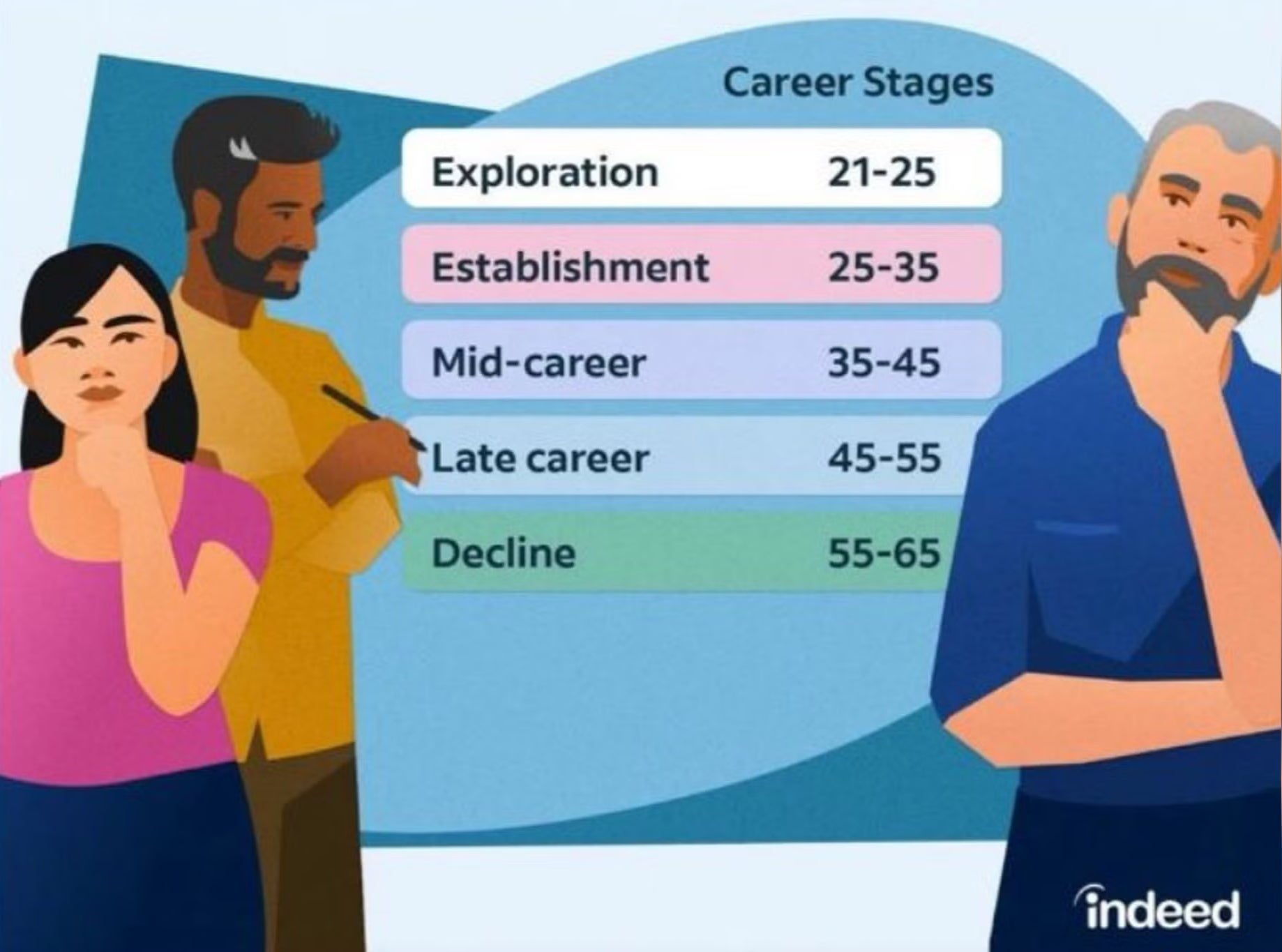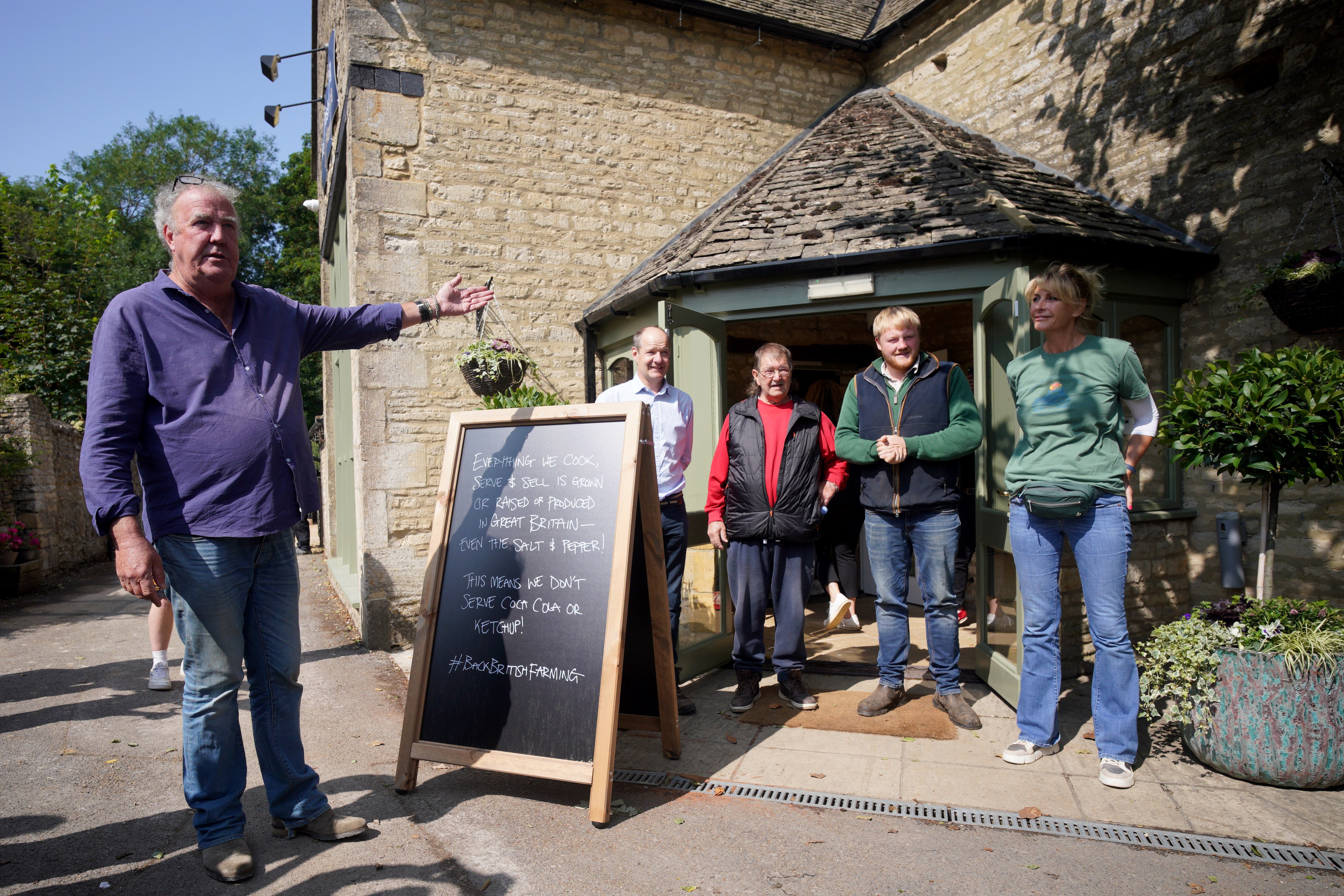If you’re this age you’re in your ‘career decline’ era apparently – here’s how to turn it into an ascent
A recruitment company has been forced to pull an advertising campaign where it sorted career stages by age. Seeing midlifers as over-the-hill is typical of how the workplace views these workers, says Grant Feller – and is exactly why they are getting it wrong


Look up the word “decline” in the thesaurus and you get alternatives such as slump, failure, weakening, enfeeblement and – here’s the important one – “on the skids”. Because if you were born before 1969 and are still foolish enough to be in employment, that’s where your career is right now. On the skids.
At least it is if you listen to the world’s biggest recruitment company, Indeed. A few days ago it launched a new advertising campaign on LinkedIn, with an incredibly “useful” guide as to what career stage you’re in according to your age.
You go from “exploration” (aged 21-25) to “establishment” (25-35) then “mid-career” (35-45) and “late career” (45-55) and then it’s all downhill from there. Because 55-65 year-olds – according to the company whose CEO is 56 – are in decline. And heaven forbid you even think of working beyond the age of 65 because, according to Indeed, there is no stage for you. Scrap heap era, maybe?
The company removed the ad pretty sharpish after an outcry from still-functioning “old” people able to navigate the comment button on social media. But it’s just another example of the way older people are relentlessly stigmatised when it comes to work and their position in the workplace.
I am, officially anyway, about to begin my long, inexorable decline towards Indeed recruitment obscurity. That I am working my socks off, with a self-created business that operates on four continents, employing a handful of freelancers, paying more income tax than I’ve ever done and collaborating with the kinds of companies and – yes, older! – CEOs – is beside the point. The real indicator of who I am is my age, and not my mid-career success apparently.

Last week I was in a meeting with a group of marketers helping them to tell the story of an imminent product relaunch, based on incredibly insightful data they’ve amassed. The product is a household name. One of the key slides segmented potential customers into four different age brackets, the oldest of which – “retired” – was identified with a picture of a woman walking around a supermarket with a walking frame. I was the only one of 12 in the room to call it out. “If you think that’s what retired people look like, this product launch will fail.” I’m still unsure if the subsequent silence means my contract will be renewed, but the perplexed faces around the table were confirmation that age bias in the workplace is absolutely thriving in an era where diversity is supposedly on the top of everyone’s agenda.
I see and hear it all the time. When I decided to leave full-time employment as a journalist 11 years ago to start a business helping people communicate more effectively by “translating” data into stories, one of my closest colleagues tried to stop me: “Grant, you’re 44, don’t you think it’s a bit late in the day to be starting again? I’ll give you a job instead.”
I think of those words every day. They spur me on. It is never too late. Age is meaningless. If the desire is there, if you’ve got a great idea and if you’re prepared to work endless hours seven days a week, it is never too late. My experience is that the older I’ve got, the more time I have to dedicate to work and the more valuable I’ve become to organisations where people want to learn not from algorithms and bots but from experience.
However, the age discrimination stigma remains. Half of adults aged over 50 have experienced it in the past year, says a report from the Centre for Ageing Better. Last year, former chancellor Jeremy Hunt, 57, experiencing his own “decline era”, urged older people – often derided for idly wandering into early retirement – to “get off the golf course and back to work”, such is the need for their skills.
Except that isn’t quite right. Companies often do not want or will not employ this generation – only 42 per cent of managers told the Chartered Management Institute they were open to hiring people aged 50 to 64, compared with 74 per cent happy to hire those aged 18 to 34.

Perhaps that’s because they assume we’ll be too expensive, but many also erroneously believe that we can’t do tech and can’t compete with digital natives. Whisper it, but they’re right. Some of us are basically making it up as we go along, still pressing control-alt-delete and crossing our fingers when things go pear-shaped.
But the difference is that we blend technology with common sense, experience, transferable skills and knowledge gleaned from decades at the top. We use tools instead of relying on them, upskilling as we go because we understand better than anyone the need to stay relevant. Plus, we don’t take sickies on Mondays because of hangovers.
And we work better, intergenerationally, than anyone. Just as this is the first time in workplace history you’ll have up to four different generations in the same office, it’s normal to date outside of our age bracket, to become parents in our fifth decade, to play sports and socialise with each other without thinking of birth dates.
By 2025, one in three British employees will be aged over 50. People like Hunt must be worried. Or maybe not. According to Pew Research, the median age of national leaders in May this year was 62, with more than a third in their sixties. Politicians seem to be the exception to Indeed’s “decline” model.

And as a society, we’re getting older. The International Longevity Centre suggests that by 2040 older people will control 63p in every pound spent in the UK economy (it’s currently around 57p). Not many go shopping with their Zimmers. If companies employed more older people, they’d know their customers better, they’d be able to predict behaviours more accurately and they’d have greater empathy to connect with the market who still have some kind of disposable income. In short, they’d make more money.
Unilever has finally understood this. It recently employed a head of age, longevity and new employment models to ensure its business better appeals to an older demographic. Or look at B&Q’s silver workforce strategy, which has placed older and reliable people into stores because their DIY wisdom is better than anything you can find on YouTube. They’ve become a reason for people to visit the stores rather than go online.
Of course, we must appreciate youthful innovation too, but we must also stop undermining older workers in the process. Unleashing the power of both can be beneficial in an untold number of ways. This is not going to work if age is used as a blunt instrument with which to measure, judge and suppress people.
Perhaps the most egregious part of the Indeed insult is the five-stage categorisation. Let’s instead think of life in two stages – the first and second half. I’ve just entered my second half. It will be shorter and we all know how it will end. But it will be more joyful and enriching because of what I’ve learned and the time I still have left to continue to learn. I will uncover fresh experiences, continue my career reinvention without quite knowing where it will take me, and live without borders and expectations.
It won’t be a decline, it’ll be an ascent.






Join our commenting forum
Join thought-provoking conversations, follow other Independent readers and see their replies
Comments